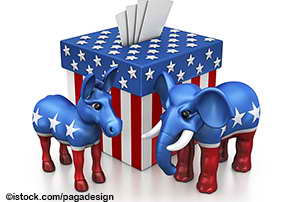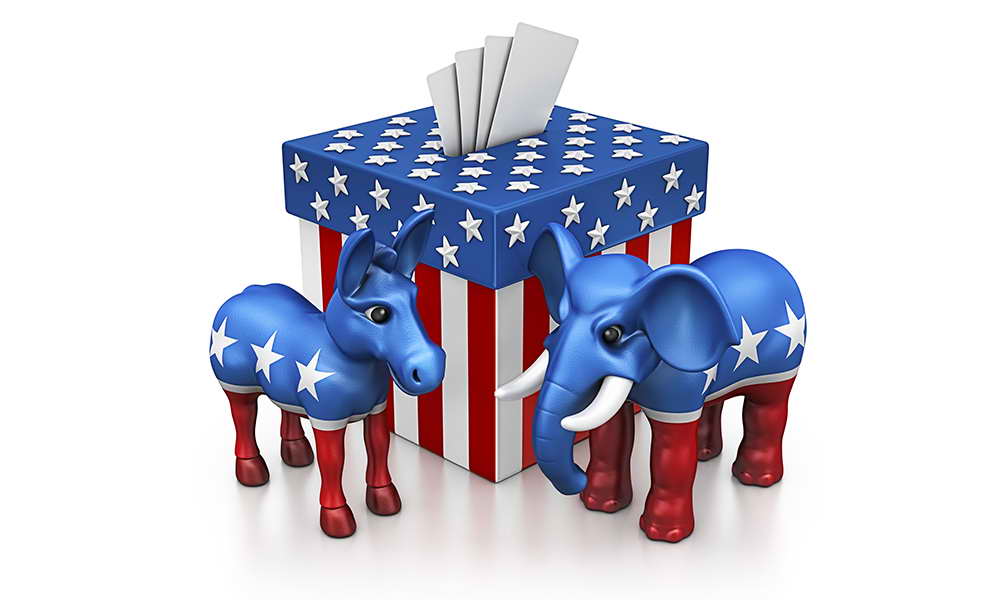March 9, 2015
3/9: Bush and Walker Emerge as Republican Top Tier… Clinton Maintains Large Lead over Democratic Rivals
Former Florida Governor Jeb Bush and Wisconsin Governor Scott Walker lead the pack of potential Republicans vying for the party’s 2016 presidential nomination. Former Arkansas Governor Mike Huckabee is the only other possible contender with double-digit support. Among Republicans and Republican leaning independents including those who are undecided yet leaning toward a candidate, Bush, 19%, and Walker, 18%, are virtually tied. But, while Bush receives just slightly more support than he garnered in McClatchy-Marist’s December survey, Walker’s support has grown from only 3% last time.
 Walker’s gains are across the board. But, key to his emergence is his appeal to conservative Republicans and Tea Party supporters.
Walker’s gains are across the board. But, key to his emergence is his appeal to conservative Republicans and Tea Party supporters.
When looking at what Republicans want in their nominee, there has been a slight, but interesting, shift. While nearly six in ten Republicans and Republican leaning independents say they value a candidate who stands on conservative principles over someone who can win, the proportion who stresses electability has increased.
Turning to the contest for the Democratic nomination, former Secretary of State Hillary Clinton is still the odds-on favorite, leading her potential rivals by more than four-to-one. Like their Republican counterparts, some Democrats have reconsidered what is more important in their party’s nominee. In December, while nearly six in ten Democrats and Democratic leaning independents preferred a candidate who would re-direct the nation from President Obama’s policies over a candidate who continued them, Democrats now divide.
How do several of the Republican candidates fare against Clinton in potential general election contests? With only four points separating them, Walker and Clinton are most competitive. But, Clinton also fails to reach 50% against Walker, Bush, and Senator Marco Rubio from Florida.
“The most notable change in this poll from December is the emergence of Scott Walker as a contender for 2016,” says Dr. Lee M. Miringoff, Director of The Marist College Institute for Public Opinion. “On the Democratic side, Clinton is still way out in front. But, it will be interesting to see if the email issue impacts her support among Democrats moving forward or if it taps into concerns some voters have about her for the general election.”
Complete March 9, 2015 McClatchy-Marist Poll of the United States
Poll points:
- In the race for the 2016 Republican nomination, 19% of Republicans and Republican leaning independents including those who are undecided yet leaning toward a candidate support former Florida Governor Jeb Bush. A similar 18% favor Wisconsin Governor Scott Walker while former Arkansas Governor Mike Huckabee receives 10%. Nine percent back retired neurosurgeon Ben Carson whereas Senator Rand Paul of Kentucky has 7%. Six percent support New Jersey Governor Chris Christie while Senator Marco Rubio of Florida has 5% of the vote. Senator Ted Cruz of Texas receives 4%, and former Texas Governor Rick Perry has 3%. Former Senator Rick Santorum of Pennsylvania and former business executive Carly Fiorina each garners 2%. One percent supports Senator Lindsey Graham of South Carolina. More than one in ten, 13%, is undecided.
- Bush and Walker emerge from a very crowded Republican field. When McClatchy-Marist last reported this question in December, Bush’s support was 16%. Walker has gained the most ground. His support has grown by 15 percentage points, from 3% three months ago to 18% now. Huckabee, the only other candidate with double-digit support, is little changed from December when he received 12%. Christie’s support has dropped from 10% to 6%.
- Walker is bolstered by very conservative Republicans, 24%, and Tea Party supporters, 25%.
- Looking at Bush’s support, he leads the field among moderate Republicans with 26%.
- 58% of Republicans and Republican leaning independents say it is more important to have a candidate who stands on conservative principles while 39% report it is better to nominate someone who can win the White House. In December, 64% thought maintaining the party’s core principles trumped nominating a candidate who could win, 33% (Trend). This is the first time since this question has been asked that the proportion of Republicans and Republican leaning independents who favor a candidate who stands on conservative principles has dropped below 60%.
- On the Democratic side, Hillary Clinton leads her potential rivals by more than four to one. 60% of Democrats and Democratic leaning independents including those who are undecided yet leaning toward a candidate favor Clinton. Vice President Joe Biden follows with 13%, and Senator Elizabeth Warren from Massachusetts garners 12%. Senator Bernie Sanders of Vermont receives 5%. Maryland Governor Martin O’Malley and former Senator Jim Webb of Virginia each has 1%. Nine percent are undecided.
- Democrats and Democratic leaning independents divide about whether it is more important to have a nominee who continues the policies of President Barack Obama, 45%, or who moves the nation in a new direction, 47% (Trend). In December, nearly six in ten Democrats, 58%, favored a nominee with a new vision for the nation while 38% wanted a continuation of Obama’s agenda.
Hypothetical General Election Contests: Walker Competitive Against Clinton
Poll points:
- Clinton, 48%, and Walker, 44%, are in a close contest among registered voters.
- Clinton, 49%, is also ahead of Bush, 42%, by 7 points. The race has tightened between Clinton and Bush. In McClatchy-Marist’s December survey, 53% supported Clinton, and 40% were for Bush (Trend).
- Clinton, 49%, leads Rubio, 42%, by 7 points.
- When matched against Perry, Clinton receives a majority, 51%, to 42% for Perry (Trend).
- Against Paul, Clinton has an 11 point advantage. 51% of voters support Clinton compared with 40% for Paul. Previously, Clinton, 54%, had a 14 point lead over Paul, 40% (Trend).
- Clinton, 53%, does the best against, Cruz, 39%. Clinton has maintained her lead over Cruz (Trend).

